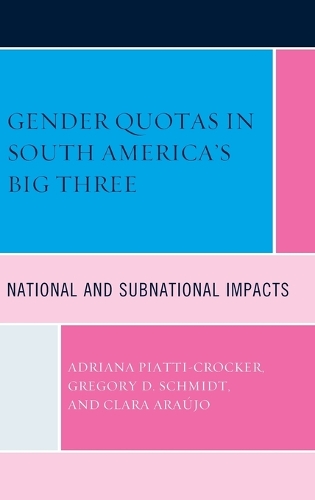
Gender Quotas in South America's Big Three: National and Subnational Impacts
(Hardback)
Publishing Details
Gender Quotas in South America's Big Three: National and Subnational Impacts
By (Author) Adriana Piatti-Crocker
By (author) Gregory D. Schmidt
By (author) Clara Araujo
Bloomsbury Publishing PLC
Lexington Books
31st May 2017
United States
Classifications
Professional and Scholarly
Non Fiction
Politics and government
Gender studies, gender groups
320.082098
Physical Properties
Hardback
212
Width 162mm, Height 237mm, Spine 19mm
454g
Description
Since the return of democracy to Latin America, policies intended to promote the inclusion of women and other underrepresented groups have been increasingly adopted throughout the region. Gender quotas have been one of the most popular and effective mechanisms employed in elections and other contexts in Latin America. This volume begins with an introduction to gender quotas, including discussion of the types and merits of gender quotas, alternative approaches to the study of quotas, and their interactions with different kinds of electoral systems. Successive chapters examine the adoption of gender quotas and their impacts in the three largest South American countries by areaArgentina, Brazil, and Peruat both national and subnational levels. These chapters also focus on specific topics that stand out in the unique experiences of these countries: substantive representation in the case of Argentina, gender and campaign finance in the case of Brazil, and regional differences in the impact of electoral rules in the case of Peru. Through careful analysis, this volume presents a nuanced picture of how different types of electoral systems may affect the election of women and the effectiveness of quotas.
Reviews
Gender Quotas in South Americas Big Three paints a richly detailed portrait of gender quotas at the national and subnational levels in Argentina, Brazil, and Peru, describing their adoption and implementation. . . . Overall, Gender Quotas provides a useful overview of the literature on quotas for readers unfamiliar with the topic; it offers a rich description of the electoral systems and gender quotas used in Argentina, Brazil, and Peru; and empirically documents the numbers of women in positions of political influence across these countries. * Perspectives on Politics *
This volume offers fresh perspectives on critical questions in the study of gender quotas. It explores the impact of quotas on women's election in three important Latin American countries, the diffusion of quota laws across Argentine provinces, the varied impact of quotas and ballot structure at the subnational level in Peru, the puzzle of why Brazil's quota laws produced only a minimal impact on numbers of women elected, and the related puzzle of why women have fared better than expected under open list proportional representation in Peru. The book provides an essential guide to the complexities of women's political representation for a broad audience including scholars, activists, policy makers, and students. -- Mala Htun, University of New Mexico
Author Bio
Adriana Piatti-Crocker is associate professor of political science at the University of Illinois, Springfield. Gregory D. Schmidt is professor of political science at the University of Texas at El Paso. Clara Arajo is professor and researcher at the Graduate Program in Social Sciences at the University of the State of Rio de Janeiro.
